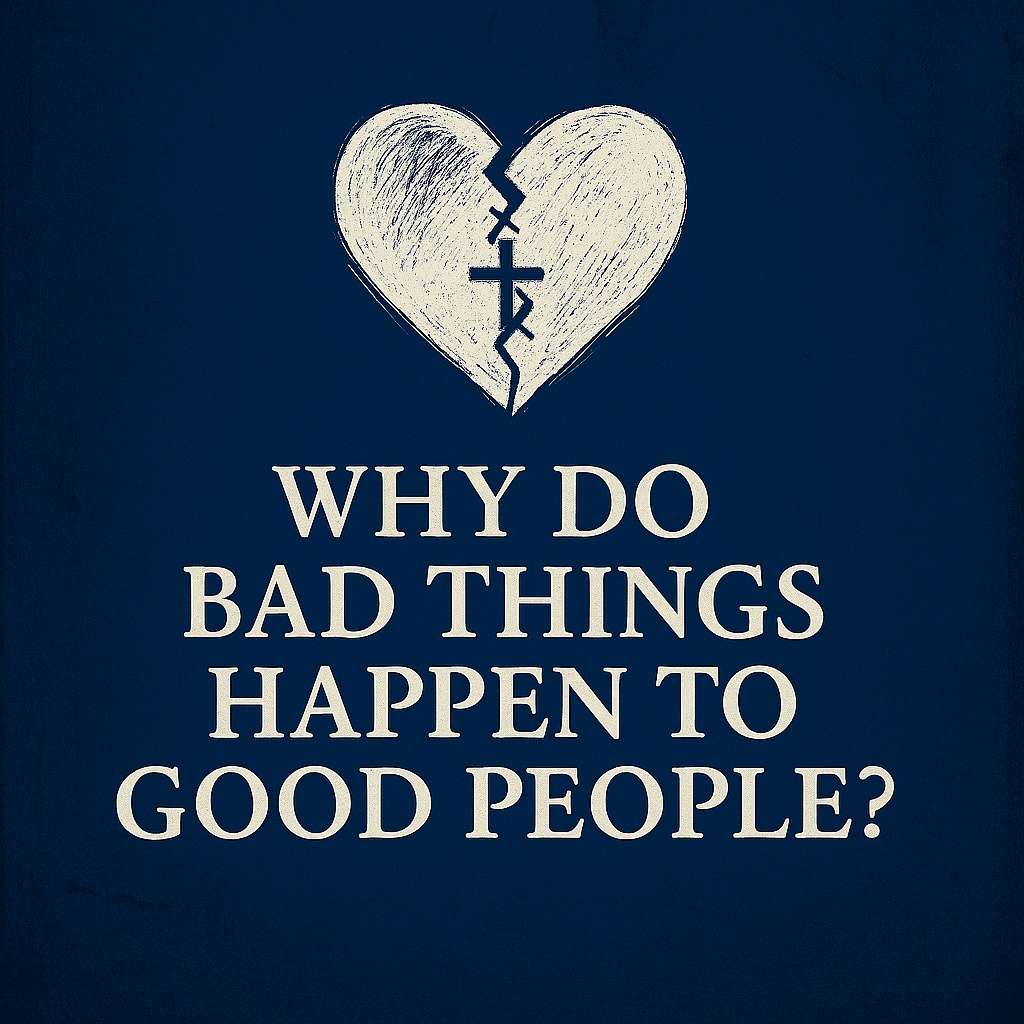Where this begins
Trusting God in Suffering begins with hard questions. Every honest faith wrestles with them. If God is good, why is life so painful? Why do the innocent suffer? Why does evil seem so real?
We will think deeply first. Then we will turn to God’s Word. Together, philosophy and theology give a path you can actually walk.
Part 1: Thinking clearly about evil
1) Good makes evil possible as a concept
No one measures silence unless sound exists. No one complains of darkness unless they know light. Evil is like darkness. It is not a thing with weight. It is the absence of something we call good. The reason you can name evil is because you already have a standard of good in your mind. If there were no good, the word evil would lose all meaning. It would be like trying to talk about a hole without dirt around it.
This is why the question “What is evil?” quickly becomes “What is good?” and “Where does that standard come from?”
2) Evil as a parasite on the good
Picture a healthy tree. Now picture a blight that feeds on it. The blight cannot exist without the tree. In the same way, evil feeds on the good. Lies feed on the human capacity for trust. Greed feeds on the real value of things and our real need to provide. Lust feeds on the beauty of human love and turns it inward. Evil is spoiled good. It bends what was straight.
If evil is parasitic, the cure is not to erase the tree, but to heal it.
3) A compass needs a true north
People appeal to “right” and “wrong” across every culture. We may disagree on details, yet we all speak as if there is a way people ought to live. That “ought” is moral grammar, a rule deeper than preference. A compass does not invent north. It points to it. The human conscience works the same way. The very fact that injustice makes us angry is evidence that justice exists beyond us. A real standard points beyond human opinion to a real Lawgiver.
4) Counterfeits prove there is real currency
Trusting God in Suffering doesn’t mean ignoring evil—it means recognizing its counterfeit nature. No one counterfeits a seven-legged unicorn coin. Counterfeiters copy real money. Evil is a counterfeit. It pretends to be wisdom, love, courage, or justice, then spends our lives on empty promises. The existence of so many believable counterfeits suggests there is a real currency of goodness that evil tries to imitate. Again, that points to an objective moral reality, not a social vote.
5) Evil is not the opposite force of God
Think of music. There is music, and there is being out of tune. Chaos is not a second orchestra fighting the first. It is the loss of pitch. God is the Creator and the standard of good. Evil is created will out of tune with that standard. This matters, because it keeps us from thinking the universe is a tug-of-war between equal powers. It is not. God is ultimate. Evil is a vandal, not a rival.
6) Freedom makes love possible and also makes evil possible
Love requires a real choice. If you program a robot to say “I love you,” you have sound but not love. God gives humans real freedom so that love can be real. Real freedom includes the possibility of misusing it. Evil is the misuse of a good gift.
This does not excuse evil. It explains the stage on which it appears.
7) Pain as a signal, not the purpose
A broken bone hurts. The pain is a signal that something valuable is damaged. Moral pain works the same way. Outrage at injustice is a sign that we are made for real justice. Sadness at loss is a sign that love is real and life has meaning. Pain points beyond itself. It is a warning light that tells the truth about our condition.
8) Philosophy’s fork
We reach a fork in the road. Either good and evil are real features of the world, or they are illusions. If they are illusions, our deepest moral experiences are lies. If they are real, a real standard exists. A real standard requires a real Source. Reason points to God.
Philosophy can take us to the door. Now we open it with Scripture.
Part 2: What God says about suffering
God does not delight in your pain
Trusting God in Suffering means remembering who He truly is. God does not create evil. God does not take joy in suffering. Scripture is clear that God is light, and in Him there is no darkness at all. He hates wickedness. He judges it. Yet He also enters this broken world to redeem it.
God is with us in the valley
The Bible never promises a life without trouble. It promises God’s presence within trouble.
“Even though I walk through the valley of the shadow of death, I will fear no evil, for You are with me.” That is Psalm 23. Presence is the promise. Jesus is not a distant idea. He is the Shepherd who walks beside us.
“Do not fear, for I am with you,” says Isaiah 41. “I will strengthen you and help you.” God does not shrug at our pain. He holds us up inside it.
Jesus suffers with us and for us
Jesus is not an observer. He is the Man of Sorrows. He knows betrayal, poverty, injustice, torture, and death. He takes on human pain, then carries sin to the cross. He is alive now and He still bears scars. Our Savior knows every tear from the inside.
Because Jesus rises, suffering is no longer a closed room. It has a door. He leads through it.
Suffering can grow real character
Scripture does not call pain good. It shows how God can use it for good.
“Consider it pure joy when you face trials of many kinds, because the testing of your faith produces perseverance,” says James 1. Perseverance finishes its work. You become mature and complete.
Paul writes that suffering produces endurance, then character, then hope. This is not about pretending everything is fine. It is about discovering that Jesus meets you inside the fire and that your faith becomes strong and gentle at the same time.
God brings good from what others mean for evil
Trusting God in Suffering means believing that even in the darkest moments, He is still weaving something good. Joseph says to the brothers who sold him, “You meant evil against me, but God meant it for good.” God can weave dark threads into a tapestry we could not imagine. Romans 8 says that God works all things together for the good of those who love Him. All things includes nights you thought would never end.
Grace is enough for the day you are living
Paul pleads for relief from a thorn he cannot remove. God answers, “My grace is sufficient for you, for My power is made perfect in weakness.” This is not a theory. It is daily bread. You receive strength for today and wisdom for the next step. You do not have to carry tomorrow this hour. Jesus carries you.
The Church walks with you
God places us in a body, not a bubble. We “weep with those who weep” and “carry each other’s burdens.” Practical love is part of God’s answer to pain. Prayer, meals, presence, counseling, advocacy, justice, and mercy are not extras. They are obedience.
The final word is hope
Jesus says, “In this world you will have trouble. But take heart. I have overcome the world.” The last chapter is not written by cancer, war, betrayal, or graves. Revelation promises that God will wipe every tear from our eyes. There will be no more death or mourning or crying or pain. This is not wishful thinking. It is the future Jesus purchased and promises. He is alive. He keeps His word.
Bringing it together
Trusting God in Suffering means recognizing that even when pain feels senseless, His presence remains constant. Philosophy shows that evil only makes sense if real good exists. Real good points to a real Lawgiver. Theology shows who that Lawgiver is. He is the Father revealed by Jesus, the Son, and made known by the Holy Spirit. He does not cause your suffering. He stands with you in it. He leads you through it. He turns ashes into beauty and mourning into dancing in His time.
You are not alone. You are not forgotten. You are loved by the God who conquers evil without erasing your freedom and who heals the world without wasting your pain.
If you are suffering today, say this simple prayer.
“Jesus, I need You. Sit with me in this pain. Lead me. Give me grace for today. Heal what is broken. Use my life for good.”
Reach out to your local church. Ask for prayer. Let someone carry part of the weight with you. Jesus is alive. He hears. He answers.

